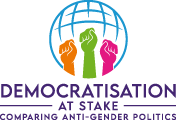Working Group 1
Revealing the historical, social-political and economic background conditions
Working Group 1 (WG1) takes a comprehensive approach to understanding the rise of anti-feminist and anti-gender mobilisations across different regions, particularly in Eastern Europe (EE) and the Newly Membered European (NME) countries. With a focus on historical, socio-political, and economic dimensions, the group aims to uncover the deeper forces driving these movements.
At the core of WG1’s work is the analysis of the background conditions that enable, facilitate, and reproduce anti-gender ideologies. The group investigates the socio-political and socio-economic contexts that give rise to these mobilisations, including the role of societal transformations, perceived crises, and feelings of uncertainty that often accompany periods of change.
A central line of inquiry explores the historical legacies referenced by anti-gender actors. WG1 examines whether these legacies reveal hidden continuities with past narratives and how such references may function as counter-strategies to societal change. The group also analyses the types of political regimes—particularly in EE and NME countries—that are becoming increasingly receptive to anti-feminist agendas, identifying specific political conditions that make such regimes fertile ground for anti-gender movements.
Moreover, WG1 investigates the impact these mobilisations have on societies and political systems, considering how they influence governance, public discourse, and democratic institutions. Another key area of focus is the cultural reframing of gender: the group looks into how gender is increasingly “culturalised” in public debates, especially when the social and economic dimensions of gender equality are deliberately sidelined. This so-called “culture war” framing, WG1 argues, has significant consequences for societal cohesion and the resilience of democratic values.
Through interdisciplinary collaboration and in-depth regional analysis, WG1 sheds light on the complex intersections between history, politics, and economics in the ongoing contestations over gender and equality.
Leadership positions
WG1 Leader: Dr. Adriana Zaharijevic
WG1 Co-Leader: Prof. Dr. Isabell Heinemann

